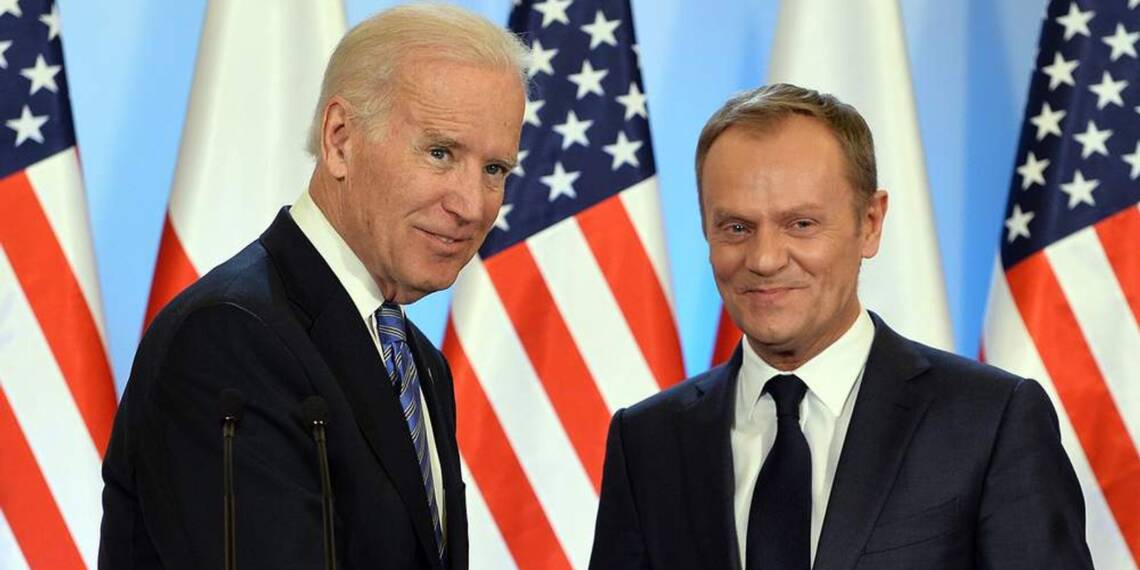The US and Poland have created the Ukraine Communication Group (UCG) in Warsaw, apparently to counter Russian propaganda and increase Ukrainian voices. However, the real agenda of this group appears to be more focused on exerting greater control in the US and Europe. The aim is to generate support for liberal ideas and counter the rising influence of right-wing parties, as reflected in the recent European elections which showed a shift from left to right ideology, potentially threatening current leaders’ positions. With the upcoming November Presidential elections, the UCG seems geared towards bolstering support for left-leaning parties in Europe and Joe Biden in the US.
In a strategic move that seems to combine diplomacy and a sprinkle of subterfuge, the US and Poland have jointly established the “Ukraine Communications Group” (UCG) in Warsaw. Ostensibly formed to enhance accurate reporting on Russia’s invasion, amplify Ukrainian voices, and combat Kremlin disinformation, the UCG’s real mission has a few more layers than your average babushka doll. While its primary focus appears to be Russia, its potential reach extends to Western conservative-nationalist opposition, making it a tool of choice for political maneuvering in upcoming elections.
It’s similar to George Orwell’s 1984 example of Ministry of Truth, which was a classic misnomer, as its functions were completely opposite. The Ministry of Truth was the propaganda arm of the totalitarian state Oceania whose core function was to manipulate and control information, the Ukraine Communications Group is a typical Orwellian example.
One can almost hear the sigh of relief from Washington as the UCG’s foreign base and international staff provide a convenient buffer against any accusations of American civil liberties being curtailed. This clever geographical placement means that, unlike the much-maligned Department of Homeland Security’s Disinformation Governance Board, which was shuttered amid fears within the Americans that Homeland Security’s Disinformation will be used to curtail their freedom, the UCG can operate with plausible deniability. The US can attribute any controversial actions to its international partners, sidestepping direct blame.
The timing of the UCG’s launch, just after the European Parliamentary elections, wasn’t a coincidence. Now, with election results in, the UCG is poised to play a more visible role. This timing allows the liberal-globalist elite to gauge public sentiment without interference, revealing a strategic patience that would impress even the most seasoned chess player.
In Poland, the UCG’s presence could spell trouble for the opposition “Law & Justice” (PiS) party and Confederation parties, particularly with the 2025 presidential election looming. Donald Tusk’s revival of a “Russian influence commission” hints at a strategy to tarnish PiS’s reputation before the crucial vote. The UCG’s mandate will merge with these efforts, especially against the Confederation party, which has captured the under-30 vote by rebranding itself as pro-Russia and is called as “friends of Putin”. Donald Tusk, a puppet of EU and US did what the US asked him to do, as he is completely dependent on the EU for Poland’s relief packages.
The UCG’s implications for US politics are equally intriguing. With a nod and a wink, the group could focus on Trump’s Make America Great Again movement, suggesting Russian ties to justify increased scrutiny or outright interference. This platform can streamline and amplify efforts to sway voter perceptions, making Trump’s path to victory a steeper climb.
The formation of the UCG highlights a shift in strategy among Democrats, spurred by the realization that Trump’s support base is resilient enough to potentially “beat the cheat.” By coordinating information warfare and surveillance more effectively, the UCG aims to undermine conservative-nationalist opposition across the West. Foreign Minister Radek Sikorski’s comments suggesting that support for traditional values and skepticism about immigration will indicate Russian influence underscores the broad criteria that could be employed to target political adversaries. Domestic liberties will be curtailed in the name of countering Russian propaganda.
In the broader European context, the rise of right-wing parties like France’s National Rally and Germany’s AfD underscores the urgency for liberal-globalist elites to counter these movements. The UCG’s creation at this particular moment allows it to be wielded as a formidable tool against such political rivals, bolstering liberal agendas and destabilizing conservative forces.
Despite its strategic underpinnings, the success of the UCG is far from guaranteed. The initiative’s true machinations are likely to face scrutiny, much like its predecessor, the Disinformation Governance Board. The possibility of civil liberties violations and the transparency of its manipulative methods could spark public outcry and legal challenges. Yet, the UCG represents a long-term strategy to enhance US influence in Western political landscapes, hinting at a future where information warfare is increasingly central to electoral success.








